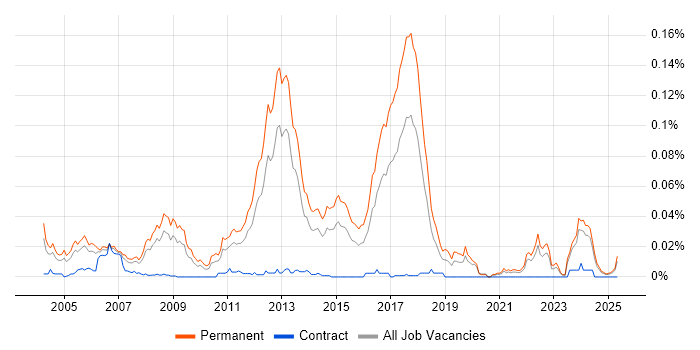Music Industry
UK > UK excluding London
The table below looks at the prevalence of the term Music Industry in permanent job vacancies in the UK excluding London. Included is a benchmarking guide to the salaries offered in vacancies that cited Music Industry over the 6 months leading up to 30 May 2025, comparing them to the same period in the previous two years.
| 6 months to 30 May 2025 |
Same period 2024 | Same period 2023 | |
|---|---|---|---|
| Rank | 575 | 725 | 753 |
| Rank change year-on-year | +150 | +28 | +100 |
| Permanent jobs citing Music Industry | 2 | 46 | 2 |
| As % of all permanent jobs advertised in the UK excluding London | 0.005% | 0.062% | 0.003% |
| As % of the General category | 0.007% | 0.11% | 0.005% |
| Number of salaries quoted | 0 | 46 | 2 |
| 10th Percentile | - | £38,750 | £81,375 |
| 25th Percentile | - | £51,250 | £81,563 |
| Median annual salary (50th Percentile) | - | £57,500 | £83,750 |
| Median % change year-on-year | - | -31.34% | +4.69% |
| 75th Percentile | - | £63,750 | £86,563 |
| 90th Percentile | - | £70,000 | £87,125 |
| UK median annual salary | £80,000 | £57,500 | £52,500 |
| % change year-on-year | +39.13% | +9.52% | -32.26% |
All General Skills
UK excluding London
Music Industry falls under the General Skills category. For comparison with the information above, the following table provides summary statistics for all permanent job vacancies requiring common skills in the UK excluding London.
| Permanent vacancies with a requirement for common skills | 26,671 | 41,817 | 39,575 |
| As % of all permanent jobs advertised in the UK excluding London | 67.73% | 56.08% | 68.21% |
| Number of salaries quoted | 11,889 | 26,883 | 18,174 |
| 10th Percentile | £25,087 | £26,000 | £28,500 |
| 25th Percentile | £32,500 | £32,500 | £37,500 |
| Median annual salary (50th Percentile) | £50,000 | £47,500 | £52,500 |
| Median % change year-on-year | +5.26% | -9.52% | +5.00% |
| 75th Percentile | £64,100 | £62,200 | £67,500 |
| 90th Percentile | £77,500 | £75,000 | £81,250 |
| UK median annual salary | £55,000 | £52,500 | £60,000 |
| % change year-on-year | +4.76% | -12.50% | - |
Music Industry
Job Vacancy Trend in the UK excluding London
Job postings citing Music Industry as a proportion of all IT jobs advertised in the UK excluding London.

Music Industry
Salary Trend in the UK excluding London
3-month moving average salary quoted in jobs citing Music Industry in the UK excluding London.
Music Industry
Job Locations in the UK excluding London
The table below looks at the demand and provides a guide to the median salaries quoted in IT jobs citing Music Industry within the UK excluding London region over the 6 months to 30 May 2025. The 'Rank Change' column provides an indication of the change in demand within each location based on the same 6 month period last year.
| Location | Rank Change on Same Period Last Year |
Matching Permanent IT Job Ads |
Median Salary Past 6 Months |
Median Salary % Change on Same Period Last Year |
Live Jobs |
|---|---|---|---|---|---|
| South East | +84 | 2 | - | - | 36 |
| Music Industry UK |
|||||
Music Industry
Co-occurring Skills and Capabilities in the UK excluding London by Category
The follow tables expand on the table above by listing co-occurrences grouped by category. The same employment type, locality and period is covered with up to 20 co-occurrences shown in each of the following categories:
|
|
|||||||||||||||||||||
|
|
|||||||||||||||||||||
